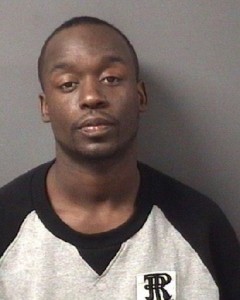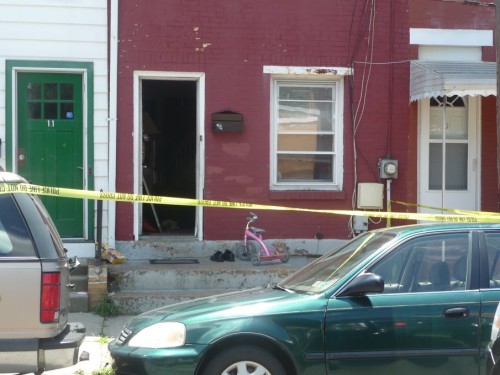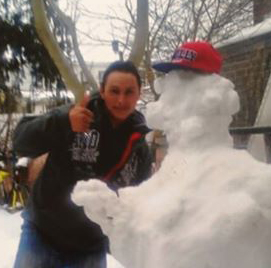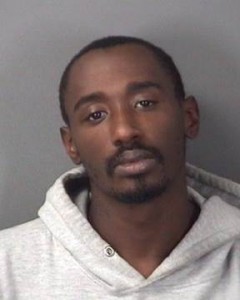Bleary eyed attorneys walked out of court Wednesday following
![Keith Wells Holmes]()
Keith Wells Holmes
an exhausting, drama-filled day in the murder trial of Keith Wells-Holmes that required them to work through part of their lunch hour.
Tempers flared as a judge wagged his finger at a defense attorney. Witnesses invoked their constitutional rights to avoid self-incrimination. And Wells-Holmes’ codefendant, who is being tried separately, was granted immunity by a judge to testify against Wells-Holmes but ended up exonerating him for the first time in front of the jury.
An attorney who shall remain nameless apprised by multiple people who participated in and sat in on the trial Wednesday said everyone candidly described the proceedings the same way: “S--t show.”
Most of it happened outside the presence of the jury, which was sequestered away in the deliberation room while attorneys from both sides hammered numerous legal obstacles.
It remains to be seen whether a jury believes alleged getaway driver Zihqwan Clemens’ testimony as attorneys from both sides agree he has credibility issues and repeatedly lied to authorities in a Jan. 23, 2013 interview two days after Trenton graffiti artist Andre Corbett was gunned down outside an apartment complex on the corner of Hoffman Avenue and Oakland Street.
Clemens, who is known as “Woodiey,” initially took the stand at a hearing outside the jury’s presence and repeatedly responded to prosecutors’ questions by invoking his Fifth Amendment right not to incriminate himself.
Clemens has been offered a plea deal calling for a 30-year sentence for his alleged role in the murder, prosecutors have said. Prosecutors believe he drove Wells-Holmes to and from the murder scene.
After a judge granted Clemens immunity, which protected him from having his
![Zihqwan Clemens]()
Zihqwan Clemens
testimony used against him at his trial, he testified Wells-Holmes paid him $5 to drive him over to “his people’s house” on Oakland Street sometime on the morning of Jan. 21, 2013. He said Wells-Holmes went into the house, returned after about 10 minutes and he drove him to another part of the city and dropped him off.
Clemens was asked directly if Wells-Holmes killed Corbett and responded that he did not, which conflicted with a prior taped statement he gave to authorities where he identified Wells-Holmes as the shooter. He was not asked whether he knew the true identity of the shooter if it was not Wells-Holmes.
Assistant Prosecutor James Scott focused on Clemens’ interview with authorities on his direct examination.
Clemens acknowledged on the day Corbett was killed he was driving around a gold Ford Windstar authorities say was linked to the murder. But he disputed being anywhere near the murder scene at the time Corbett was shot.
That contradicted with what he told police during his interview, which could be played for jurors later this week. Turner has asked that jurors watch Clemens’ entire five-hour interview so they can get a flavor for his repeated lies, which the defense attorney went over one by one during her cross examination.
Clemens acknowledged he initially lied to authorities when he claimed he did not know the owner of the van. The van was registered to his girlfriend, according to testimony.
Those lies were at the center of a Gross hearing earlier in the day as attorneys were saddled with figuring out how to reconcile Clemens’ testimony with his past statement to law enforcement.
Clemens had previously admitted hearing gunshots and seeing Wells-Holmes run back toward his van, prosecutors said. A detective testified earlier in the trial the van was seen on surveillance parked up the street from where Corbett was shot. Authorities seized the van the same day they arrested Clemens on an outstanding warrant.
Clemens said he had not been truthful with authorities during his interview and agreed with Turner’s assertion that he “threw [Wells-Holmes] under the bus” after detectives told him Wells-Holmes had possibly implicated him as the shooter.
Clemens said he was told at some point in his interview with detectives that they had Wells-Holmes in custody. A Mercer County detective has testified Clemens had called Wells-Holmes while he was in police custody.
Clemens denied under oath ever placing a phone call to Wells-Holmes.
Clemens said detectives brought up his then-3-year-old son and told him that whether he saw him again depended on if he cooperated with their investigation. Clemens said the possibility of not seeing his son again made him “sad,” and he agreed with Turner’s assertion that he gave detectives information he believed they wanted so they could charge Wells-Holmes for the murder.
Clemens’ testimony followed hours of delays in testimony as court officials determined whether witnesses Isiah Greene and Marquise Risher would testify.
Greene and Risher’s DNA was found on cans found inside the gold van.
Greene, who faces unrelated murder and attempted murder charges, invoked his Fifth Amendment right to not incriminate himself. Risher testified in front of the jury but nothing substantial came from his testimony.
Turner has hinted that Greene was a more likely suspect in Corbett’s murder and has asked questions of witnesses that make it plausible she will formally accuse Greene of the murder as part of a third-party guilt defense. Turner, however, has declined to reveal her legal strategy. She would not say whether he client will testify.
Getting anyone to testify in this trial has proved a difficult task for prosecutors.
Acting Prosecutor Angelo Onofri had to meet with state Attorney General John Hoffman, who ultimately signed off on prosecutors’ request for immunity for Clemens. Immunity is rarely extended to witnesses, and Scott said he could not remember a time before Wednesday where he had been authorized to make such an offer.
![]()




















